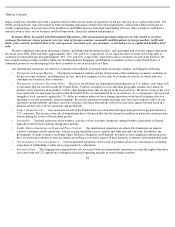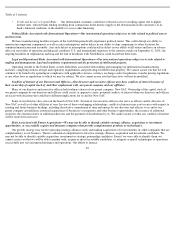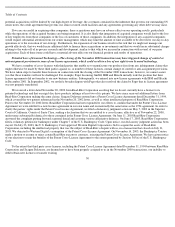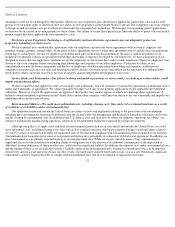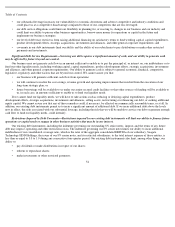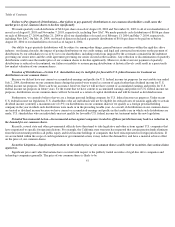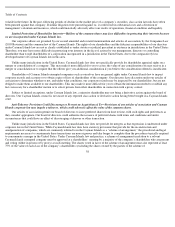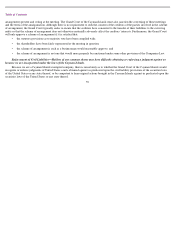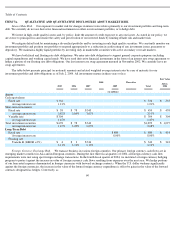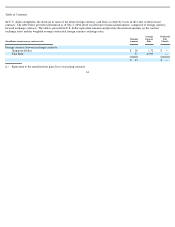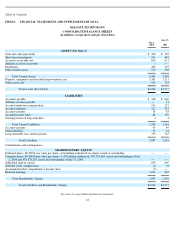Seagate 2003 Annual Report Download - page 58
Download and view the complete annual report
Please find page 58 of the 2003 Seagate annual report below. You can navigate through the pages in the report by either clicking on the pages listed below, or by using the keyword search tool below to find specific information within the annual report.
Table of Contents
Failure to Pay Quarterly Distributions—Our failure to pay quarterly distributions to our common shareholders could cause the
market price of our common shares to decline significantly.
We made quarterly cash distributions of $0.04 per share on each of August 22, 2003 and November 21, 2003 to all of our shareholders of
record as of August 8, 2003 and November 7, 2003, respectively, including New SAC. We made quarterly cash distributions of $0.06 per share
on each of February 27, 2004 and May 21, 2004 to all of our shareholders of record as of February 13, 2004 and May 7, 2004, respectively,
including New SAC. On July 19, 2004, our board of directors declared a quarterly distribution of $0.06 per share to be paid on or before
August 20, 2004 to our shareholders of record as of August 6, 2004.
Our ability to pay quarterly distributions will be subject to, among other things, general business conditions within the rigid disc drive
industry, our financial results, the impact of paying distributions on our credit ratings, and legal and contractual restrictions on the payment of
distributions by our subsidiaries to us or by us to our shareholders, including restrictions imposed by the covenants contained in the indenture
governing our senior notes and the credit agreement governing our senior secured credit facilities. Any reduction or discontinuation of quarterly
distributions could cause the market price of our common shares to decline significantly. Moreover, in the event our payment of quarterly
distributions is reduced or discontinued, our failure or inability to resume paying distributions at historical levels could result in a persistently
low market valuation of our common shares.
Taxation of Distributions—Certain U.S. shareholders may be ineligible for favorable U.S. federal income tax treatment on
distributions on our common shares.
Because we did not have any current or accumulated earnings and profits for U.S. federal income tax purposes for our taxable year ended
July 2, 2004, distributions on our common shares during this period were treated as a return of capital rather than dividend income for U.S.
federal income tax purposes. There can be no assurance, however, that we will not have current or accumulated earnings and profits for U.S.
federal income tax purposes in future years. To the extent that we have current or accumulated earnings and profits for U.S. federal income tax
purposes, distributions on our common shares will not be treated as a return of capital distribution and will be treated as dividend income.
Furthermore, we currently believe that we are a foreign personal holding company for U.S. federal income tax purposes. Under recent
U.S. federal income tax legislation, U.S. shareholders who are individuals will not be eligible for reduced rates of taxation applicable to certain
dividend income (currently a maximum rate of 15%) on distributions on our common shares if we qualify as a foreign personal holding
company in the year in which such distributions were made or in the preceding taxable year. As a result, if distributions on our common shares
are treated as dividend income because we have current or accumulated earnings and profits in the taxable year in which such distributions are
made, U.S. shareholders who are individuals may not qualify for favorable U.S. federal income tax treatment under the new legislation.
Potential Governmental Action—Governmental action against companies located in offshore jurisdictions may lead to a reduction in
the demand for our common shares.
Recently, several state and other governmental officials have threatened to take legislative and other actions against U.S. companies that
have expatriated to specific foreign jurisdictions. For example, the California state treasurer has requested that certain pension funds eliminate
from their investment portfolios all public equity and fixed income holdings of companies that have reincorporated in foreign jurisdictions. If
we are included within the scope of such legislation or governmental action, it may reduce the demand for, and have a material adverse effect
on the price of, our common shares.
Securities Litigation—Significant fluctuations in the market price of our common shares could result in securities class action claims
against us.
Significant price and value fluctuations have occurred with respect to the publicly traded securities of rigid disc drive companies and
technology companies generally. The price of our common shares is likely to be
57



